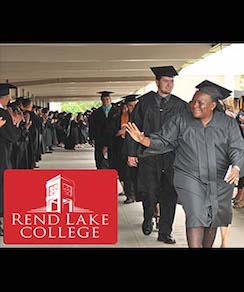Student retention is often a daunting task, especially in an open admission community college environment. “Our students’ success is our own success” is part of the mission statement at Rend Lake College (RLC). This commitment to students is evident by the fact that RLC has been repeatedly named one of the Aspen Institute's Top 150 Community Colleges in the nation. This recognition is based on a measure of our student success rates, which include first-year retention, three-year graduation rates and credentials awarded. At RLC, we understand that no matter how good our results are, they can always be improved. So, we continually work to make enhancements in our processes to help as many students as possible reach their educational and career goals.
Rend Lake College has participated in several Pathways to Results projects over the last five years. The PTR model has been an essential tool to help us understand how to make and drive evidence-based changes throughout our College. RLC views this model as an important and worthwhile method of helping identify potential issues and create positive solutions for our students’ benefit.
During our PTR Project last year, we were given the opportunity to use the PTR Model to evaluate our processes related to a measure that fell below state goals—Student Retention and Transfer—in the Career and Technical Education (CTE) world, this is referred to as the Perkins “3P1” measure. After we developed and engaged our team, we compiled and disaggregated data on a cohort of high school students who had taken CTE dual credit courses, and began to focus our efforts on identifying potential barriers for those students who did not persist to completion. This included using our quantitative data, but also talking to and surveying students.
A few unexpected opportunities for improvement emerged.
First, we discovered that nearly 6% of students who did not persist or transfer had actually completed at least a certificate, but never received it. We also discovered that an even higher percentage of students were within one semester of completing a degree or certificate in these pathways. This was staggering to us. These numbers combined to represent a total of 20% of the students we are losing being somewhere between one form (application for graduation) or one semester away from completion!
We took our exploration a bit further and began to talk to students individually and were reminded of the many obstacles to completion, including financial ones that could arise from personal, health, or academic troubles. We found that many students leave RLC owing the college money. A large portion of these students had received a reduction in the financial aid distribution due to non-attendance. The resulting fees act as a barrier to reenrollment after students have overcome whatever issue resulted in their need to stop out.
Our team worked on developing strategies to improve our processes in response to these findings. Our goal was to find ways to identify and award degrees to students who may have completed a certificate or degree but had not applied for graduation, as well as developing a method of identifying and supporting students who might be struggling academically or financially early enough in a semester to offer them timely support. We are also exploring strategies for using the degree audit process to feed into a program for reengaging students within one semester of completion.
These findings led us to propose an Automated Degree Audit reporting system, and a more proactive, timely Early Alert process. These two systems are the focus of RLC’s PTR Year 2 project. We have begun working on creating both solutions and are excited to evaluate the results.
The Pathways to Results model is a great way to facilitate positive changes that are driven by a focus on equitable outcomes for students. If you have never participated in the PTR process, or have only done so once, you are missing out. The benefits for students make the PTR process worth the time and effort involved.






Leave a comment